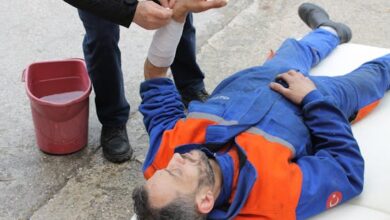Bahamas National Security Minister Observes Jamaica Electronic Monitoring System
NASSAU, Bahamas – The Bahamas Minister of National Security, Hon. Tommy Turnquest, led a delegation of government officials to Jamaica on January 8, 2009, to observe the Government of Jamaica’s Electronic Monitoring of Offenders Pilot Project.
In addition to Minister Turnquest, the delegation consisted of Mr. Peter Deveaux Isaacs, Undersecretary, Ministry of National Security, Dr. Ellison Rahming, Superintendent, Her Majesty’s Prison, Mr. Raymond Gibson, Assistant Commissioner of Police (Crime), Ms. Marva Minns, Deputy Director, Department of Social Services, Mr. Garvin Gaskin, Assistant Director, Department of Legal Affairs, and Inspector Zhivargo Dames, Police Communications.
The delegation was transported to Jamaica via Defence Force aircraft piloted by Lt. Commander Marcus Evans.
Before calling on the Jamaica Correctional Service Department, Minister Turnquest made a courtesy call on Senator the Honourable Arthur Williams, Minister of State in the Ministry of National Security, with specific responsibility for Corrections.
Last year November, the Bahamian Parliament adopted legislation to permit the electronic monitoring of offenders.
During the debate on the legislation, the Minister indicated that the Government of Jamaica had embarked on a pilot project to test the effectiveness of electronic monitoring. The electronic, GPS and web-based technology that makes it possible to tag, monitor and track offenders has been available for some time, but only recently in the Caribbean region.
While the Bahamas Government enacted its policy position into law last year, and foreshadowed the early introduction of a pilot project, the Jamaican Government proceeded firstly with the development of the pilot project. Thus while Bahamian Government officials could benefit from observing an electronic monitoring system in operation in the region, the Jamaican Government was able to review Bahamian legislation.
The first phase of the two year Jamaican Electronic Monitoring Project began in November 2008 and ended on January 10, 2009.
Dilieu Technology, a company based in Oakland, California was designated the sole Service/Direct Procurement provider for the implementation of the system. Minister Turnquest indicated that Dilieu is one of the four companies that have expressed interest in providing the EM System to the Bahamas Government; so in addition to observing how the system worked in general, the Minister also had the opportunity to assess Dilieu’s product, and benchmark it with the other vendors.

Pictured from left: Mr Peter Deveaux Isaacs, Undersecretary,Senator Arthur Williams, Minister of State, Ministry of National Security, Jamaica,Minister Turnquest, Mr Richard Reese, Permanent Secretary, Ministry of National Security, Jamaica,Supt Elliston Rahming, HMP, Mr Garvin Gaskin, Assistant Director, Department of Legal Affairs.
During the demonstration at the Correctional Services Department, the delegation was given an overview of Corrections in Jamaica and the rationale for the consideration of the EM System.
The Jamaican government indicated three broad rationales for electronic monitoring:
1) Detention; to ensure individuals remain within the boundaries of designated places known as inclusion zones, and only move , for example from home to work, school, church and back.
2) Restriction: to ensure individuals do not enter prescribed areas known as exclusion zones that might include a former victim’s neighbourhood or known criminal hangouts.
3) Surveillance: enables the continuous tracking without restricting movement.
The Jamaican EM System is administered by the Department of Corrections. In preparation for the pilot project, Corrections Officials and Probation After Care Workers were trained in tagging and monitoring. A Monitoring Centre was established, equipped with computers configured for monitoring and tracking. Because Jamaica does not have the legal framework for the EM System, volunteers were selected to participate in the pilot project.
Since November 11th 2008, when the first volunteers were tagged, 48 volunteers have now been tagged and tracking has occurred throughout all parishes.
Minister Turnquest and the Bahamian delegation were able to tour the facility and see the tagging, monitoring and tracking of volunteers in real time throughout Jamaica’s rugged, mountainous terrain.
Jamaican authorities indicated that the system has successfully tracked the movement of all volunteers. They anticipate that the EM System could impact recidivism among offenders, overcrowding in prisons, money spent in corrections of offenders and the supervision of offenders. EM could also help to maintain the family unit, provide a smooth transition for those leaving an institution, allow offenders to maintain employment and support his family. The Jamaican Government estimates that it currently spends more than $25 per day to house each incarcerated inmate. Minister Turnquest noted that since The Bahamas spends approximately $35 per inmate, per day, the EM System could cut this cost by almost 50%.
Minister Turnquest was pleased with his visit. He was particularly pleased that representatives of all agencies of government, with stakeholder interest in the EM System got an opportunity to see the system in operation. Minister Turnquest indicated that over the next few months, the government will implement an EM pilot project, and that the experiences of Jamaica will help to inform the development of the Bahamas’ pilot project.


